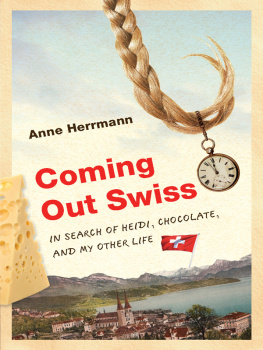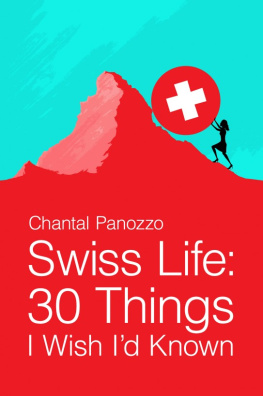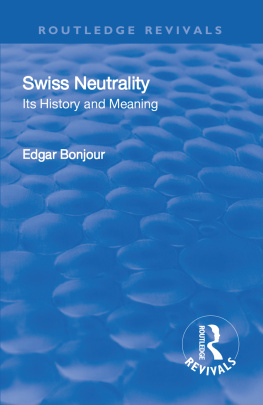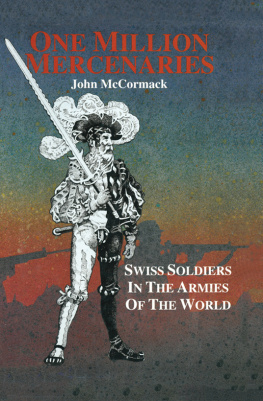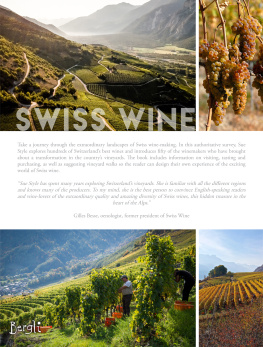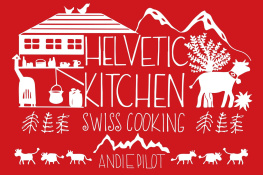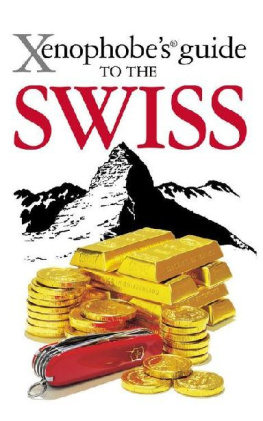
In Search of Heidi, Chocolate,
and My Other Life
Anne Herrmann
The University of Wisconsin Press
The University of Wisconsin Press
1930 Monroe Street, 3rd Floor
Madison, Wisconsin 53711-2059
uwpress.wisc.edu
3 Henrietta Street
London WC2E 8LU, England
eurospanbookstore.com
Copyright 2014
The Board of Regents of the University of Wisconsin System
All rights reserved. No part of this publication may be reproduced, stored in a retrieval system, or transmitted, in any format or by any means, digital, electronic, mechanical, photocopying, recording, or otherwise, or conveyed via the Internet or a website without written permission of the University of Wisconsin Press, except in the case of brief quotations embedded in critical articles and reviews.
Printed in the United States of America
Library of Congress Cataloging-in-Publication Data
Herrmann, Anne, author.
Coming out Swiss: in search of Heidi, chocolate, and
my other life / Anne Herrmann.
pages cm
Includes bibliographical references.
ISBN 978-0-299-29840-1 (cloth: alk. paper)
ISBN 978-0-299-29843-2 (e-book)
1. Herrmann, Anne. 2. Swiss American womenBiography.
3. Swiss AmericansBiography. 4. SwissUnited States.
5. SwitzerlandSocial life and customs.
6. SwitzerlandHistory. I. Title.
E184.S9H47 2014
305.8935073dc23
2013033113
In memory of
Elisabeth (Bethli) Herrmann-Rtschi
19211978
and
Juri/Georg/George/Georges [Ostroumoff] Herrmann
19212007
There are things so deeply personal that they can be revealed only to strangers.
Richard Rodriguez, Hunger of Memory: The Education
of Richard Rodriguez (1982)
Given desire and purpose, I could make my home in any of them [French/English/Walloon]. I dont have a house, only this succession of rented rooms. That sometimes makes me feel as though I have no language at all, but it also gives me the advantage of mobility. I can leave, anytime, and not be found.
Luc Sante, The Factory of Facts (1998)
Having taken citizenship in April 1869, Nietzsche may be considered Switzerlands most famous philosopher. Even so, he on occasion succumbed to a sentiment with which few Swiss are unacquainted. I am distressed to be Swiss! he complained to his mother a year after taking citizenship.
Alain de Botton, The Consolations of Philosophy (2000)
When the history of the Revolutionor indeed of anything elseis written, Switzerland is unlikely to loom large.
Tom Stoppard, Travesties (1975)
In the course of her project, the Daughter must end up violating the values of her parentsthemselves restless, westeringin favor of her own rootedness.
Richard Rodriguez, Days of Obligation: An Argument
with My Mexican Father (1992)
Contents
Illustrations
Acknowledgments
I would like to thank those graduate students whose invaluable research assistance made parts of this book possible: Emily Lutenski, who began looking for things before I knew what the book was about; Monica Fagan, who learned things about the Swiss she wasnt sure she needed to know; and Alexandra Kruse, who expressed more clearly than I could what it is that the book had finally become. I am grateful to James Mitchell for bringing me the Swiss Family Robinson via Disneyland, to Tomomi Yamaguchi and Hiroe Sanya for acquainting me with Heidi in Japan, and to Navaneetha Mokkil-Maruthur for pursuing with me Switzerland in Bollywood.
I reminisce fondly about the hours I spent in the elegant building of the Stadtarchiv in the old part of Zrich, learning things about a family history that had remained untold, and in the Dokumentationsbibliothek Davos, where Timothy Nelson so kindly provided materials that made it possible for me to read all day, and even night, although I was in the Alps and expected to be out of doors.
I thank two writers: Eileen Pollack, who has written about a woman she imagined had to be Swiss and encouraged me even before there was anything legible to read, and Christine Rinderknecht, the Swiss author I most admire, whose ability to write fiction highlights the limitations of my own writing, even as she tries to convince me that the material is all there, I just need to narrate it.
Tricia Ortiz kindly drove with me around the Bay Area and joined the schoolchildren at Sutters Fort, and Bert Ortiz generously accompanied me to a barely remembered New Glarus. To him I owe the freedom to write, the conversation that interrupts the solitude and a companionship that encompasses travel, even if it means hiking up one more Heidi path.
I am grateful to have had the opportunity to present Heidiland: Whats Heidi Got to Do With It? at the Homelands in Question: Re-locating Europe in the Spaces of Cultural Negotiation Conference at the Taubmann College of Architecture and Urban Planning in 2005 and Nave Cartography: Aleksandra Mirs Switzerland and Other Islands at The Cultural History of Cartography: A Symposium in 2012, both at the University of Michigan.
I remain indebted for institutional support from the College of Literature, Science and the Arts and Office of the Vice President for Research at the University of Michigan in the form of a Michigan Humanities Award. I thank the college for an additional term off, even if it meant signing an early retirement agreement, which has become its own kind of gift.
I would also like to recognize those colleagues whose friendship cannot be acknowledged simply by conveying gratitude: Michael Awkward, who has shared the pleasures and pains of being an author, kept me from losing courage and read various manifestations of this project; Abby Stewart, who has been with me in all things having to do with women and gender and has kindly read chapters of this book; Helmut Puff, who keeps me abreast of all things Swiss and reminds me of how American I am because I am not foreign born; and Susan Najita, who, although in a field far afield from my own, encourages me to experiment. Martha Umphrey remains an intellectual interlocutor par excellence.
I thank the Southwest Review for publishing Coming Out Swiss/ Living in the Fifth Switzerland and the Yale Review for making public Heimweh, or Homesickness.
Finally, I would like to thank Raphael Kadushin for being such a strong believer.
Coming Out Swiss
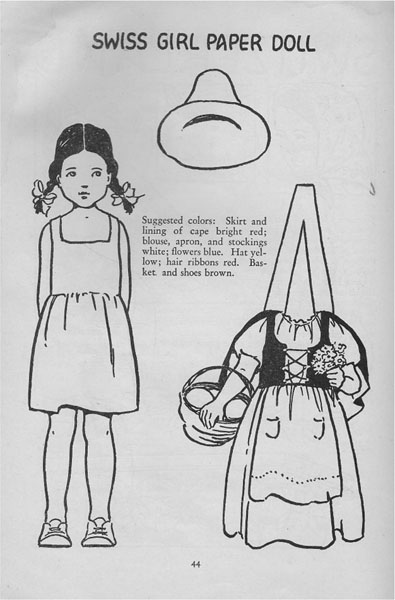
Swiss girl paper doll, Instructor Handbook Series: Handwork for all Grades (F. A. Owens Publishing Co., Dansville, NY, 1937)
Prologue
Open Secrets
Coming Out Swiss
There are many kinds of secrets. Family secrets, bank secrets, skeletons in the closet. Sexual secrets are the ones we become most loquacious about, confessing them to priests, discussing them on cell phones. Sins cannot be forgiven, symptoms cannot be cured, until theyve been exposed. Phone conversations, no longer confined to the privacy of the public phone booth, have made the public a space for private revelations.
What about linguistic secrets? Speaking a foreign language native to a European country half the size of Maine, in which it is not the only language people speak. Passing, for most of ones life, as monolingual.

